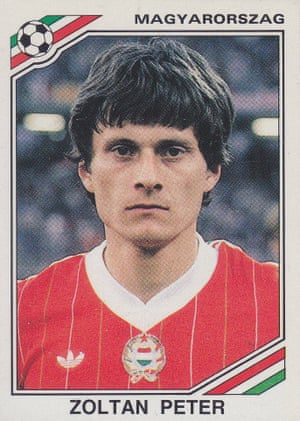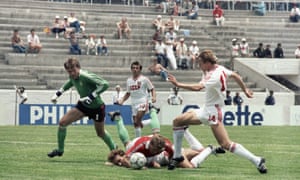[ad_1]
Before the internet ruined the World Cup there was wonder in ignorance. You could look forward to discovering great players and teams about whom you knew next to nothing. In 1986 my brother and I hoped the tournament would be all about some Hungarian called Zoltan Peter. Our reason was bad.
All we knew about Peterwas his name and his face because he seemed to be in every pack of Panini stickers we bought. Every time we removed that shiny wrapper there he was, seemingly mocking us with his Lego-man hairdo and the haunting expression of someone who knew there is no problem so grim it cannot be made worse.
When the tournament kicked off we had nearly 100 Peterstickers. He was unswappable. My brother started sticking them all over the place. Our home came to resemble the capital city of a totalitarian state, with pictures of the feared ruler wherever you turned.

The hope was Peter would reveal himself to be a genius in Mexico, the breakout star of the tournament, a player whose stickers would suddenly be in hot demand, making us akin to lucky imbeciles who accidentally bought shares in an oil company just before it struck black gold.
Some pundits made Hungary dark horses for success. They had qualified instead of the Netherlands and they would be highly motivated for their first match – against the USSR 30 years after the bloody suppression of the 1956 Hungarian revolution.
We thought we knew a little about the Soviets, since the first Republic of Ireland match we attended was against them in the first qualifier for the finals. A glorious goal by Mickey Walsh yielded a win that took Ireland nowhere. USSR advanced by winning all their home games but none of their away ones. They were so blunt in the run-up to Mexico – scoring once in five friendlies – that they replaced their manager just before the tournament, rehiring Valeriy Lobanovskyi, whom they had previously jilted. Hungary’s for the taking?
Peter turned out to be a tall 21-year-old, a left-back on the raw side. When Nikolay Larionov ran down the right for the Soviets in the second minute, Peter hurtled towards him with all the control of a man using roller skates for the first time. Crash. Viktor Chanov dabbed the resultant free-kick towards the near post, Hungary defended pitifully and Pavel Yakovenko slotted the ball into the net. Oh, for Pete’s sake.
Then Sergei Aleinikov blasted in a stupendous drive from miles out. Two-nil to the USSR after five minutes. My brother and I now yearned, petty as you like, for total Hungarian humiliation.
In sport it can feel wholesome to want your rival to be crushed. Easing off is a betrayal. Back in the Cold War days commentators called teams from behind the Iron Curtain “crack outfits” and “ruthless machines”, their forwards not baby-faced assassins but cold-blooded, robotic ones. It was dehumanising hooey but, on this occasion, we demanded the Soviets be heartless.

But wait! In the 21st minute Hungary won a free-kick within shooting range and Peter stepped up to take it. He ran over the ball, the big tease, and Lajos Detari booted it into the stands. Then another woeful Hungarian tackle led to a penalty being lashed home by Igor Belanov, who, like Yakovenko, proved a genuinely thrilling discovery.
In the 62nd minute Hungary made their first substitution: off came Peter. Two young clowns on a couch thousands of miles away made obscene hand gestures in his direction. Then we urged the USSR, as if they were our proxies, to enforce more vengeance.
With eight players from Dynamo Kyiv they were brilliant, far too nifty for disintegrating opponents. But in the second half the Soviets, all too human, relaxed a tad, saving energy for a deep run in the tournament. They still scored three more times, twice into an empty net after slick moves and once thanks to an own goal by Laszlo Dajka.
USSR even missed another penalty. Vadym Yevtushenko blazed it so high the commentator wondered if he had misfired out of sympathy. But some people felt 6-0 was the least Peter and co deserved – and, at the final whistle, those people tore up a pile of unused stickers and staged an Argentina 78-style ticker-tape parade in their front room.
Peter did not appear again in the tournament.
[ad_2]
Source link
